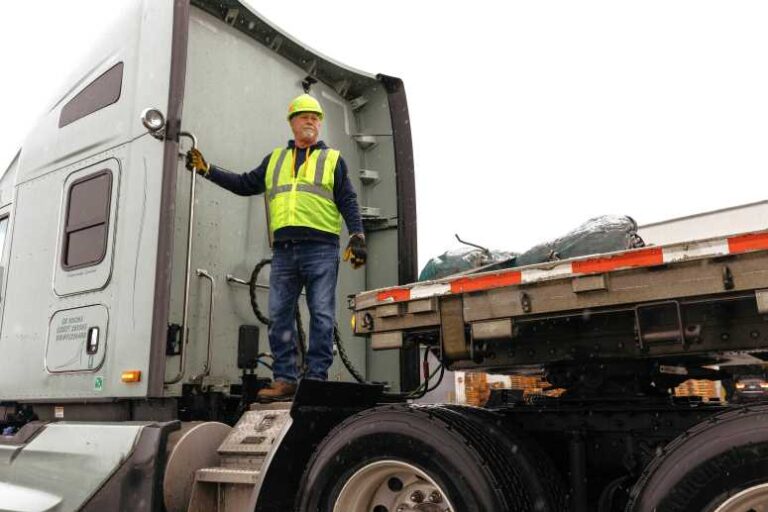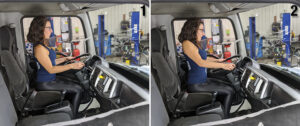BEAVERTON, Ore. — A new study by DAT Freight & Analytics has found that almost 75% of truck drivers find their jobs physically and emotionally stressful.
Additionally, many drivers reported an inability to care for their well-being.
“As the country prepares for National Truck Driver Appreciation Week, from Sept. 10-16, and celebrates the vital role of truck drivers in our economy, the DAT survey results show why it’s important to empathize with the challenges they face in their personal and professional lives,” said Jeff Hopper, chief marketing officer at DAT. “For all that you are, and all that you do. We thank you, truck drivers.”
The survey of 504 truck drivers, 337 of whom own the truck they drive, revealed the conditions that lead to stress on the road.
- Drivers miss time with friends and family: 54% of truck drivers spend less than 24 hours a week at home.
- Drivers have a long workweek: 33% of drivers are driving more than 49 hours a week.
- Nutrition is a challenge: 63% of truckers cook meals in their truck two to six days a week, and 37% eat fast food two to three days a week.
- Long hours make it difficult to manage sleep and exercise: 63% of truckers sleep 6 hours or less per night, and 38% of truck drivers say they take medication to help them sleep.
The survey also examined how truck drivers manage their mental health.
Nearly 46% of respondents said access to mental health services would be an effective way to help them manage stress. However, only 40% of male drivers said they would consider speaking with a counselor or therapist about their emotions and experiences, compared to 58% of female drivers.
Family members are less likely to relate to living and working on the road. More than 71% of truckers’ children did not follow in a parent’s footsteps, despite riding along when they were younger.
“Many truck drivers develop strategies to manage the long hours, isolation and health issues that come with the job,” Hopper said. “However, finding suitable places for sleep, healthy meals, and other necessities are constant challenges. It’s essential to recognize the role truckers play in our economy and to do whatever we can to recognize their hard work.”
As an expression of gratitude to the nation’s truckers, DAT Freight & Analytics will reward five randomly chosen truckers with a free, six-month subscription to DAT One Pro.
To learn more and enter for a chance to win, visit instagram.com/datfreight during National Truck Driver Appreciation Week.
Truckers can also win one of 10 $100 VISA gift cards. Visit facebook.com/datfreight and follow #appreciateDATtrucker for details and entry information.
Linda Garner-Bunch has been with The Trucker since 2020, picking up the reins as managing editor in 2022. Linda has nearly 40 years of experience in the publishing industry, covering topics from the trucking and automotive industry to employment, real estate, home decor, crafts, cooking, weddings, high school sports — you name it, she’s written about it. She is also an experienced photographer, designer and copy editor who has a heartfelt love for the trucking industry, from the driver’s seat to the C-suite.











Stress, they say, this is already a 5 or a 6, it is not only dealing daily with loneliness, it is with people who do not know that an 18-hour truck does not stop the same as a vehicle but leaving it is also the problems of the house and if at all That’s why we add poor food, deplorable salary and pay, we increase the concern, it’s in our heads, let’s put the police to that, they know that after 5pm there are no more parks and when the ELD runs out, you have to look for a small place, that’s where the vultures appear. that instead of being behind real criminals, they are dedicated to parking fines and unforeseen impressions after hours, that is, during the driver’s break, all this combined plus the little money we currently earn already add up to 5, no stress, this is a 5 It hurts to say it but this is wrong and it can’t be handled like this
After 30 years OTR starting as a company driver and finishing as a fleet owner, I’m glad I’m done. The industry has gone to crap. The miles have gone away, restaurants no longer exist and truck stops are called travel centers/plazas. The “drivers” of today think the industry should cater to their wants and needs. Anyone that would ask me about being a driver, I told them, if you have a family, can’t be away from home for long periods of time or didn’t like being alone then this is not the job for you.
Nowadays these “drivers” rely more on a tablet than a cb to communicate. Our day/night consisted of running 600-700 miles or more (yes sometimes two logbooks) straight. Keeping the left door shut. Deregulation had just taken affect and everyone was trying to make their way around scales because since the states took over, they saw a cash cow. This was also pre GPS. All we had was a rand McNally road atlas.We only had the bank of phones on the wall when you entered the truck stop and the ones at the tables. No cell phones. Companies didn’t allow riders and most didn’t allow pets. All that for 22 cents a mile. So come on give a me a break. These new drivers feel like they are under stress? Lonely? Are they serious. Get out of the industry then while you still can. Tell others not to do it too because it’s so hard. Look the industry if anything has gotten easier. Less miles and better pay. Better equipment, no more cab overs, refrigerators in the trucks, inverters and the list goes on. But, that’s the new breed of steering wheel holders. Shorts, flip flops, cell phones and GPS.
I agree, most drivers don’t know what to expect because of the training in school and the reality of going out on the road yourself it’s really a disaster. I think there should be more team drivers. Send me out to California and when I unload in Los Angeles, send me back to New England as a team it goes by fast and when you get back, you should have three days off.